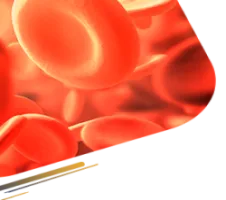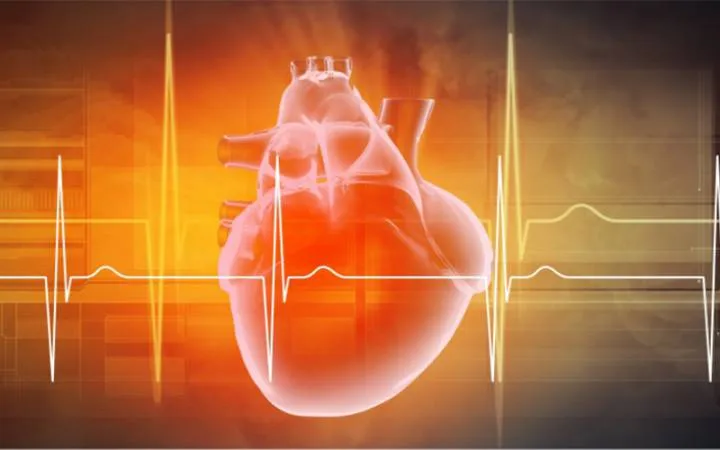The complete blood count (CBC), also known as the Hemogram - 6 Part (Diff), is an essential comprehensive blood panel that allows your doctor to evaluate each type of cell in your blood. The CBC blood count measures the amount of red blood cells (RBC), white blood cells (WBC), and platelets (PLT). Each of these types of blood cells performs important functions, so determining their levels can provide important health information.
Tests Included (24)
- BASOPHILS - ABSOLUTE COUNT
- EOSINOPHILS - ABSOLUTE COUNT
- LYMPHOCYTES - ABSOLUTE COUNT
- MONOCYTES - ABSOLUTE COUNT
- NEUTROPHILS - ABSOLUTE COUNT
- BASOPHILS
- EOSINOPHILS
- HEMOGLOBIN
- IMMATURE GRANULOCYTES(IG)
- IMMATURE GRANULOCYTE PERCENTAGE(IG%)
- TOTAL LEUCOCYTES COUNT
- LYMPHOCYTE PERCENTAGE
- MEAN CORPUSCULAR HEMOGLOBIN(MCH)
- MEAN CORP.HEMO.CONC(MCHC)
- MEAN CORPUSCULAR VOLUME(MCV)
- MONOCYTES
- NEUTROPHILS
- NUCLEATED RED BLOOD CELLS
- NUCLEATED RED BLOOD CELLS %
- HEMATOCRIT(PCV)
- PLATELET COUNT
- TOTAL RBC
- RED CELL DISTRIBUTION WIDTH (RDW-CV)
- RED CELL DISTRIBUTION WIDTH - SD(RDW-SD)
A CBC may be used to help diagnose a range of health conditions and also monitor how the body is affected by different diseases or medical treatments.
Purpose of the Complete blood count
The purpose of a complete blood count is to give your health care provider details about the state of your health. It is an important medical tool because it uses one sample to analyze the complete spectrum of cells found in the blood as well as some of the characteristics of those cells.
Because it provides information about every type of cell in the blood, the CBC can provide information related to a wide variety of medical problems.
The primary uses for the CBC are diagnosis, monitoring, and screening:
- Diagnosis is determining the cause of a patient’s symptoms. The CBC can identify many different abnormalities in the blood that can be linked to distinct medical problems. For this reason, the CBC is frequently used as a diagnostic test. In many cases, it can confirm or rule out certain conditions and may be used alongside other tests to arrive at a definitive diagnosis.
- Monitoring is the process of following a patient’s condition over time. A CBC count can be used to monitor patients who have previously been diagnosed with blood disorders. It can help see how a person’s condition has responded to treatment, and it may be used to watch for side effects of some medical treatments.
- Screening is testing to find health problems before there are any symptoms. In some cases, a doctor may prescribe a CBC as a screening test during routine check-ups.
What does the Complete blood count measure?
A CBC involves multiple measurements that include the number of blood cells and some of their physical features. A standard CBC includes several elements related to red blood cells, white blood cells, and platelets that are described in the following sections.
Red blood cell measurements:
Red blood cells (RBCs) are also called erythrocytes. They carry oxygen from your lungs to the tissues and organs in your body. A CBC test includes several basic measurements of RBCs:
- RBC count is the total number of red blood cells in your blood sample.
- Hemoglobin measures the amount of this oxygen-carrying protein that is found inside RBCs.
- Hematocrit measures the proportion of your total blood volume that consists of red blood cells.
A CBC also provides details about the physical features of red blood cells. These are known as RBC indices. There are several kinds of RBC indices:
- Mean corpuscular volume (MCV) is a measurement of the average size of red blood cells.
- Mean corpuscular hemoglobin (MCH) is the average amount of hemoglobin inside each red blood cell.
- Mean corpuscular hemoglobin concentration (MCHC) is a calculated measurement of how concentrated hemoglobin is within red blood cells.
- Red cell distribution width (RDW) is a measurement of the variation in the size of your red blood cells.
The CBC may include the reticulocyte count, which is the total number of newly released young red blood cells in your blood sample. It may also be measured as a percentage.
White blood cell measurements:
White blood cells (WBCs) are also called leukocytes. They are an important part of the body’s immune system.
A standard CBC measures the WBC count, which is the total number of white blood cells in a sample of blood.
A common variation of the CBC is the complete blood count with differential. The white blood cell differential is a breakdown of the amount of each of five different types of WBCs:
- Neutrophils: Neutrophils make up the greatest percentage of WBCs and are produced by the bone marrow to fight a diverse array of inflammatory and infectious diseases.
- Lymphocytes: Lymphocytes such as B-cells and T-cells are found primarily in the lymph system and fight bacteria and other pathogens in the blood.
- Monocytes: Monocytes work in conjunction with neutrophils to combat infections and other illnesses while removing damaged or dead cells.
- Eosinophils: Eosinophils are WBCs that are activated in response to allergies and some types of infections.
- Basophils: Basophils are involved in early identification of infections as well as wound repair and allergic reactions.
Initial blood testing may include a CBC with differential, or this test may be done after an initial standard CBC was abnormal. Because each white blood cell type has a different function, the CBC with differential can be used to identify abnormal levels of specific WBCs, which may offer clues about an underlying health concern.
Platelet measurements:
Platelets, also called thrombocytes, are cell fragments that circulate in blood and play an essential role in blood clotting. When there is an injury and bleeding begins, platelets help stop bleeding by sticking to the injury site and clumping together to form a temporary plug.
A standard component of the CBC is the platelet count, which is the number of platelets in your blood sample.
In some cases, your doctor may have the laboratory also measure the mean platelet volume (MPV), which determines the average size of platelets.
When should I get a complete blood count?
The CBC is a very common test. You may have a CBC performed when you have a routine health examination, when you are being diagnosed or assessed for a disease or condition, or when your provider is monitoring the effectiveness of a treatment.
Because blood counts can be affected by a diverse range of health conditions, the CBC may be recommended by your doctor to help identify the cause of many different kinds of symptoms. Your health care provider is in the best position to address whether a CBC is appropriate in your specific situation.
FAQs related to Complete blood count
Q. How to get tested?
Answer: A Complete blood count requires a blood sample. Laboratory testing involves using a needle to remove a small amount of blood from a vein in your arm.
Q. Can I take the Complete blood count at home?
Answer: Yes, we at Secondmedic ensures that you get good health at affordable price. Hence, we give you the best Complete blood count Offer that you can get online and free home service.
Q. How much does the Complete blood count price?
Answer: At-home Liver tests usually cost less than Rs. 1,000, which includes the cost of shipping your blood sample to the lab. We at Secondmedic provide you the best offer at Rs. 500.
Q. Who should get this Complete blood count done ?
Answer: Men and women over and above the age of 5 years can get this test done.
Q. How to prepare for the Complete blood count?
Answer: No special preparation needed. Inform your doctor about the medications you may be taking.
Q. How long will the results take?
Answer: You will receive your reports through SMS and Email from Laboratory within 24/48 hours
Booking Procedure:
- Fill the booking form on right side with Name, Address, Mobile no.
- Blood/Urine samples will be collected from your Home address. 10-12 hrs fasting is required.
- You need to make the payment by cash to Thyrocare when Technician comes to pick up the samples OR Pay online after confirmation of booking.
- Reports will be couriered at your residence in 3-4 working days if hardcopy is opted. We will email the reports within 48-72 hrs on your email address mentioned while booking.
- Sample pickup at home
- Online reports within 48 hours

User Reviews
Please add your review
Similar test/profile
At Second Medic, we offer a comprehensive range of lab tests to help diagnose and monitor a wide variety of medical conditions. Our state-of-the-art laboratories are equipped with the latest technology and staffed by highly trained professionals, ensuring that our patients receive accurate and reliable results.
We offer a wide range of lab tests, including blood tests, urine tests, and other diagnostic tests. Our lab tests are designed to provide a comprehensive view of a patient's health, allowing us to detect and monitor medical conditions early on, and make informed treatment decisions.
We understand that lab tests can be stressful, which is why we strive to make the process as easy and comfortable as possible for our patients. Our team of friendly and compassionate professionals are always available to answer any questions or concerns that our patients may have.
At Second Medic, we are committed to providing the highest quality lab tests and personalized care to our patients. We believe that every patient is unique and deserves a personalized approach to their healthcare, and we work closely with our patients to develop individualized treatment plans that meet their specific needs.
If you are in need of lab tests, we invite you to schedule an appointment at one of our convenient locations today. Our team looks forward to serving you and helping you achieve optimal health and wellness.








